How Do Hotels Keep Towels Soft? - Unveiling Industry Secrets
Hotels are known for their ability to maintain the quality and softness of their towels, contributing to a luxurious experience for guests. Towel softness is often a hallmark of a hotel’s attention to detail and commitment to comfort.
To achieve this, hotels employ a range of techniques and practices, ensuring that every towel feels fresh and gentle to the touch. Maintaining the softness of towels is not only about enhancing guest satisfaction but also about upholding the establishment's reputation for quality and care.
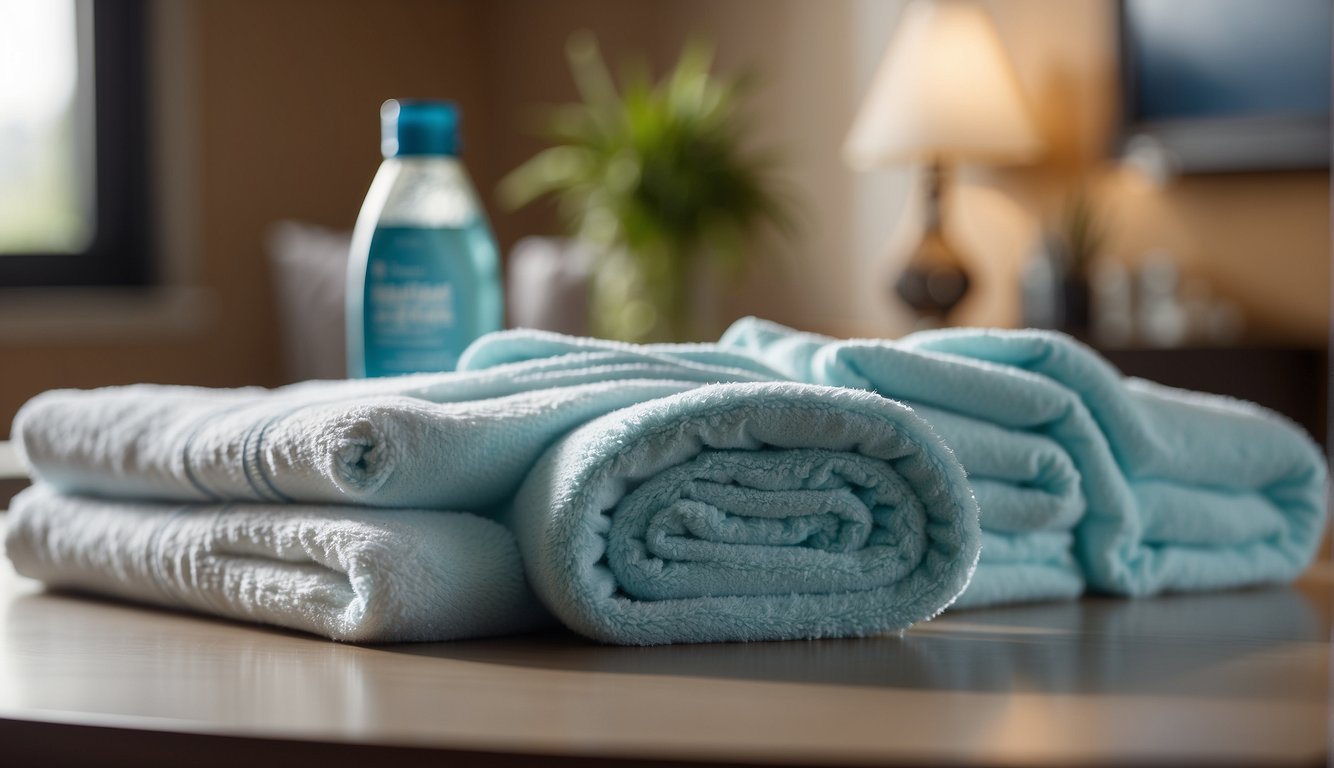
The process begins with the selection of high-grade materials. Hotels typically opt for towels made from premium cotton varieties, such as Egyptian or Turkish cotton, which are renowned for their long fibres and exceptional softness. These materials are capable of withstanding the rigours of frequent washing while retaining their plush quality. After use, the towels undergo a thorough laundering process that removes dirt and oils without compromising the fibres’ integrity.
The laundering practice itself is a delicate balance of using the right detergent, water temperature, and fabric softeners. While harsh chemicals are avoided to prevent towel fibres from breaking down, a mild yet effective detergent is essential for cleaning. The water temperature is carefully controlled to be hot enough for sanitising but not so hot as to damage the fibres.
Finally, fabric softeners are used judiciously to ensure towels remain soft without diminishing their absorbency. Through these careful methods, hotels ensure that their towels remain a symbol of comfort and luxury throughout their lifespan.
Understanding Towel Softness
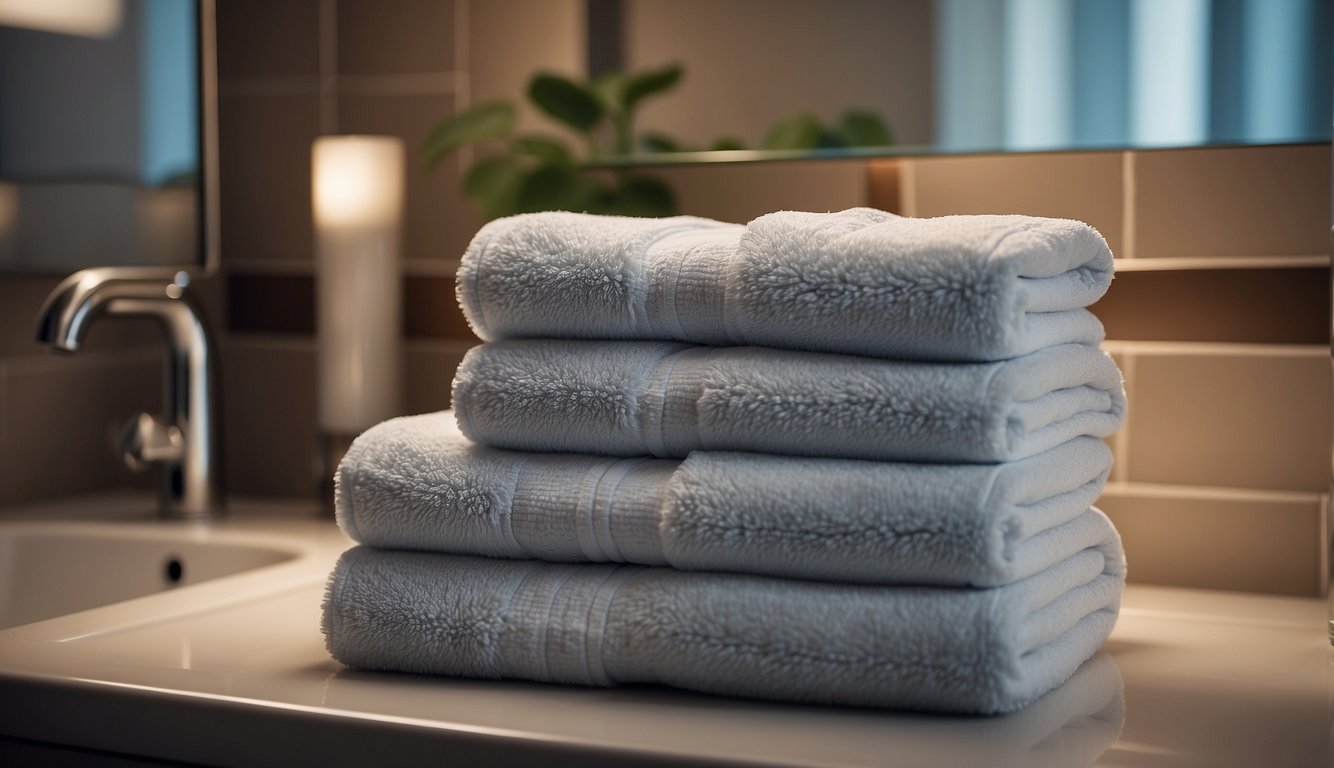
The quest for softness in towels is multifaceted, involving both the type of materials used and the manufacturing processes. A towel's feel can be attributed largely to the quality of cotton from which it is made. Egyptian cotton and Pima cotton are renowned for their superior quality, due in part to their longer fibres. These longer fibres create a smoother and more durable yarn, culminating in a plush and comfortable feel.
Ring-spun cotton combines both long and short fibres, tightly twisted together, to create a smoother and finer yarn. This process ensures that the resulting fabric is not only strong but also incredibly soft to the touch.
Table: Key Attributes of Quality Towel Materials
|
Attribute |
Benefit |
|
Longer Fibres |
Enhanced smoothness, softness, durability |
|
High-Quality Cotton |
Comfortable, lofty texture |
|
Ring-spun Cotton |
Durable, plush comfort |
|
High Thread Count |
Luxurious feel, fine texture |
Towels with a high thread count are often perceived as more luxurious. The density of threads, particularly in high-quality cotton towels, contributes significantly to the fabric's softness. While fluffy towels are associated with comfort and luxury, achieving and maintaining this fluffiness is a synergy between the use of high-quality materials and specific fabric care techniques.
Maintaining softness also depends on proper laundry practices, including the use of fabric softeners and the avoidance of harsh chemicals. However, it's the inherent quality of the fibres and the fabric construction that play the most critical roles in the inherently soft and plush nature of high-quality towels.
The Role of Washing Techniques and Detergents
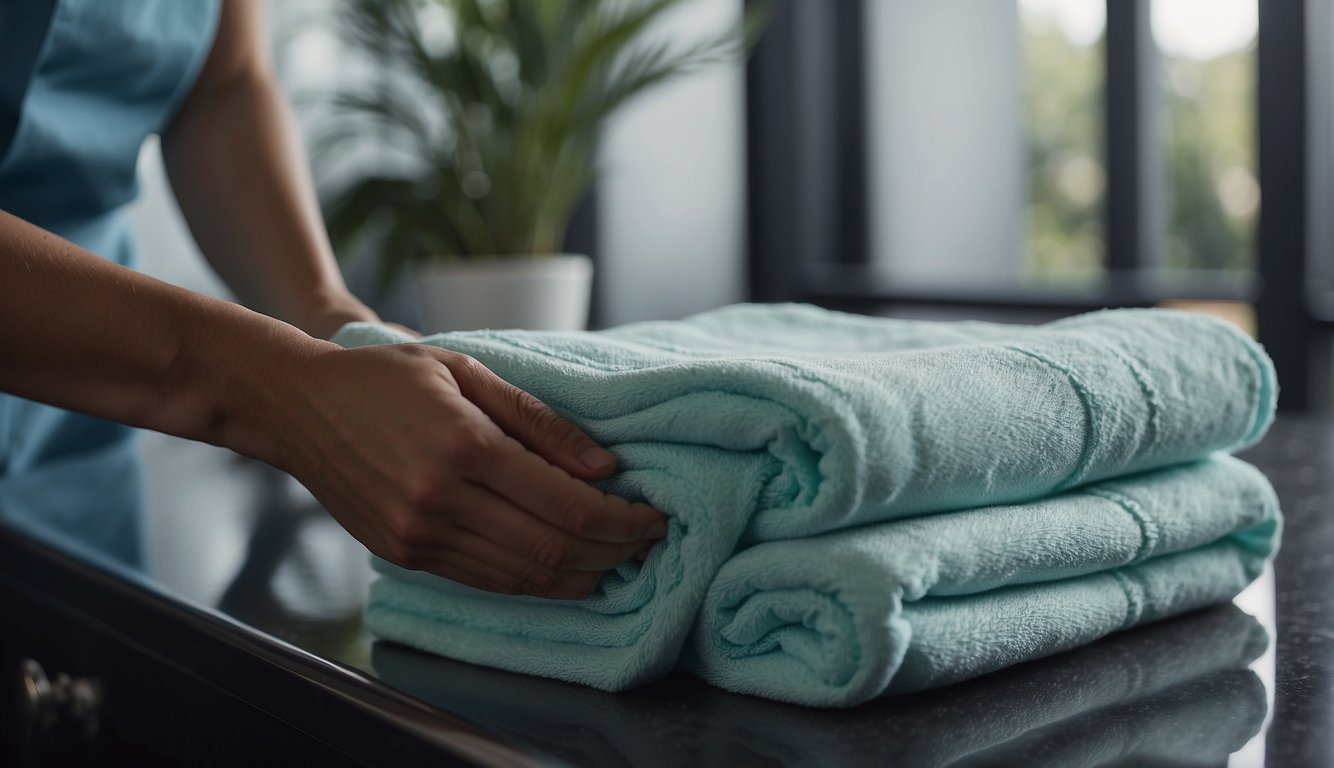
Effective washing techniques and the choice of detergents are crucial for maintaining the softness of hotel towels. The selection of the right detergents and optimising washing methods can make a significant difference in the outcome.
Choosing the Right Detergents
For hotel towels, using high-quality detergents is essential. These detergents should contain enzymes to break down stains without damaging the fabric. When selecting a detergent, hotels often opt for eco-friendly options to reduce environmental impact.
Hotels should look for laundry detergents that are designed specifically for softness and have components like baking soda and oxygen bleach, which maintain towel integrity and colour without the harshness of chlorine bleach.
- Liquid detergents are typically a preferred choice as they dissolve more easily in soft water, reducing residue that can stiffen towels.
- Incorporating fabric softeners in the final rinse can enhance towel softness, although care should be taken as overuse can reduce absorbency.
Optimising Washing Methods
The washing process itself also plays a pivotal role in towel softness. Hotels use washing machines that are capable of regulating hot water and warm water temperatures to suit different fabrics and stains.
- Warm water is ideal for general washing as it is gentle on towels but also effective at cleaning.
- A periodic wash with hot water can be useful for deep cleaning without causing excess wear if done sparingly.
- The addition of white vinegar during the rinse cycle can act as a natural fabric softener and remove any lingering odours, while a small amount of baking soda can boost the effectiveness of the detergent.
By meticulously selecting detergents and refining washing methods, hotels can ensure their towels remain soft and inviting for guests.
Effective Drying and Maintenance
Ensuring towels remain soft involves meticulous drying methods and refined maintenance procedures. The tactile quality of towels is heavily influenced by how they are dried and stored.
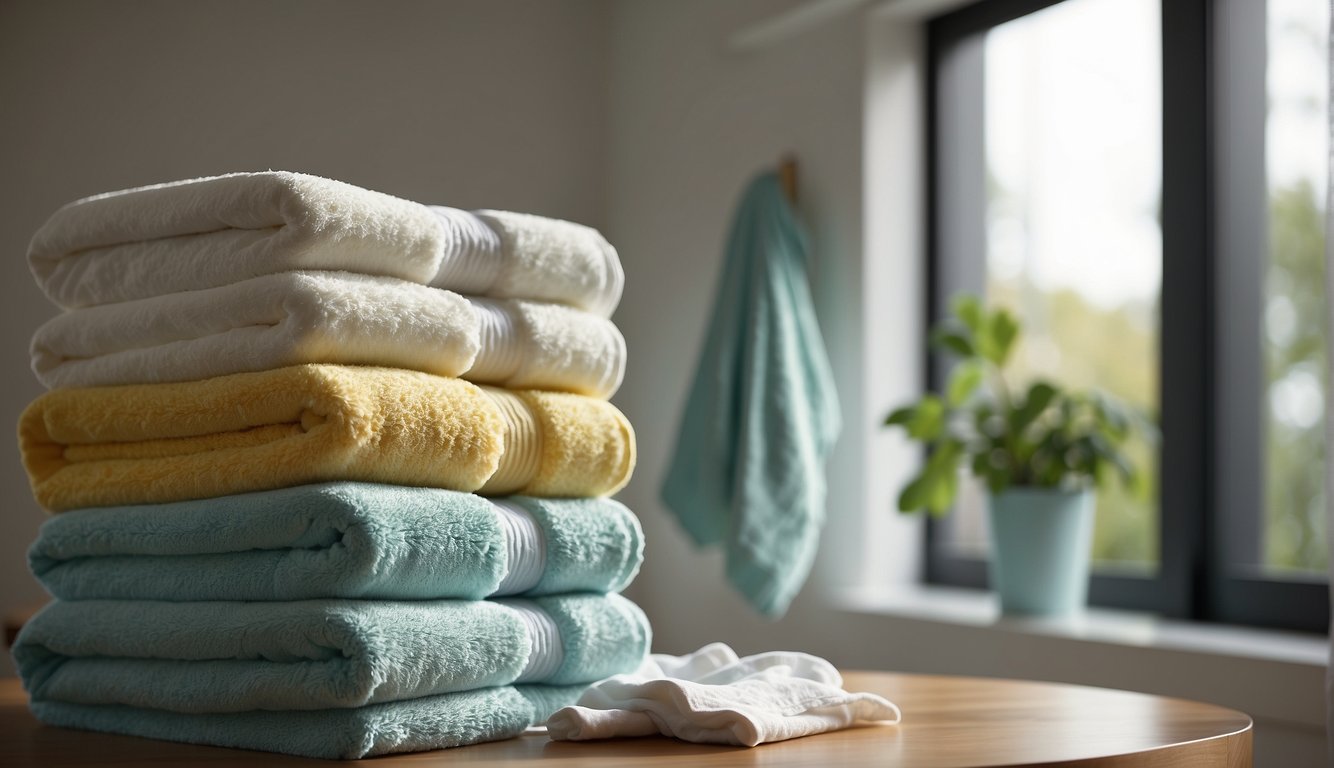
Drying Methods for Optimising Softness
The drying process is crucial for maintaining the softness of towels. Tumble dryers are commonly used to achieve this, as they can fluff up the fibres effectively. It is important to use a moderate heat setting to prevent damage to the towel fibres. Incorporating dryer balls or a clean tennis ball can help separate the towels, reducing drying time and minimising static electricity.
To optimise towel softness:
- Avoid overloading the dryer – this allows for better air circulation.
- Ensure towels are only slightly damp when removing them from the dryer.
- Use of fabric softener should be moderate; an overabundance can reduce absorbency.
Proper Storage and Handling
After drying, towels should be stored properly to retain their softness. Storage systems must be designed for convenience and to prevent compression, which can affect the plushness of the towels. Towels should be folded neatly and not overcrowded on shelves or in linen closets.
Key guidelines for towel storage:
- Always ensure towels are completely dry before storing to prevent mildew.
- Store towels in a cool, dry place away from direct sunlight.
- If towels come with a label, follow specific storage recommendations to maintain quality.
The assurance of a towel's softness extends from precise drying techniques to attentive care during storage.
Addressing Common Towel Problems
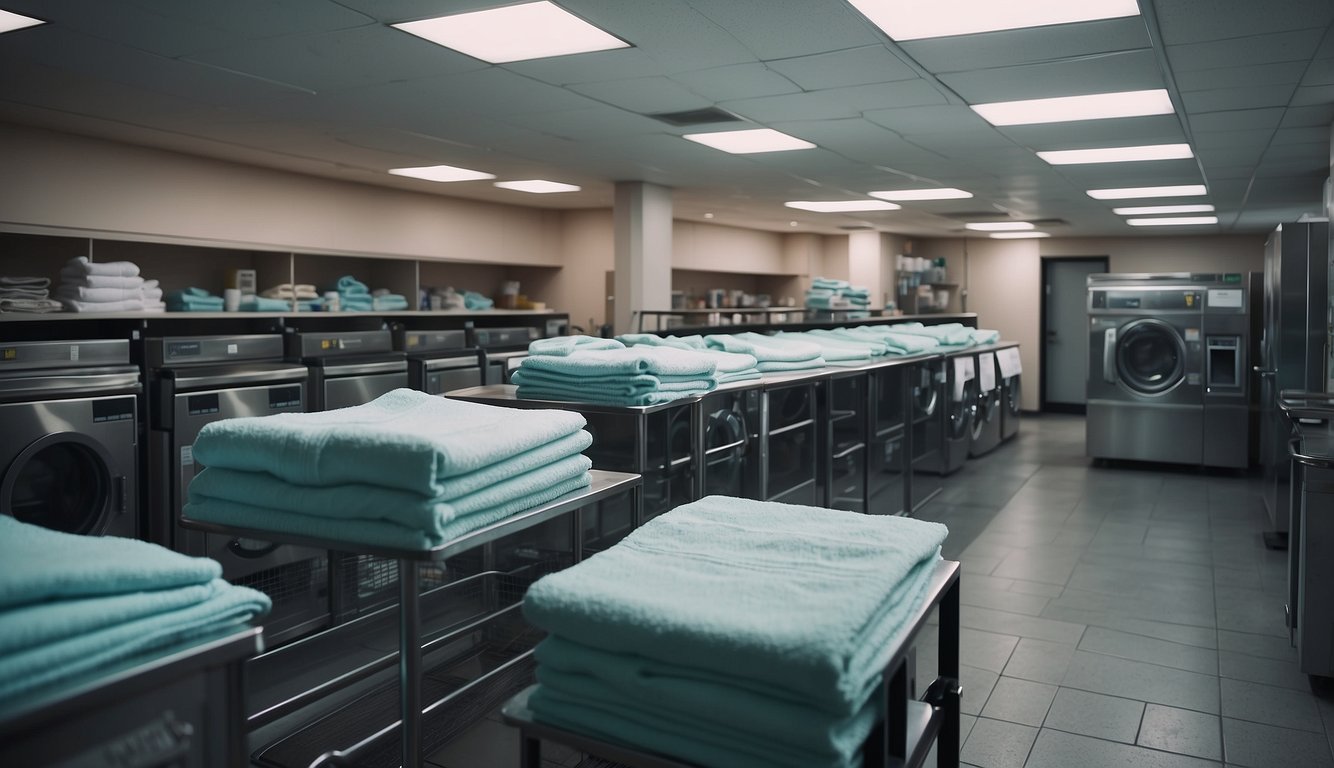
In the quest for maintaining high-quality and luxurious towels, hotels often face challenges such as hard water effects and maintaining the pristine condition of white towels. This section explores practical solutions deployed by hotels to address these issues and keep towels softer and more absorbent.
Combating Hard Water and Stains
Hard water contains minerals like calcium and magnesium, which can make towels less absorbent and feel rough over time. Five-star hotels often install water softening systems to remove these minerals, ensuring that towels maintain their softness.
For existing stains, the approach is targeted:
- Baking Soda & Vinegar: A mixture of baking soda and vinegar can help in softening towels and removing mild stains without the harshness of some chemicals.
|
Method |
Description |
|
Pre-Wash Soak |
Towels are soaked in a solution of baking soda and water. |
|
Washing Cycle |
Vinegar is added during the washing cycle to enhance cleanliness and softness. |
- Specialised Cleaning Agents: Specific detergents designed for hard water use are employed to keep the cotton fibres in towels free from mineral build-up.
Keeping White Towels Pristine
The whiteness and cleanliness of white towels serve as a hallmark of a hotel's attention to detail and exceptional standards. To maintain their pristine appearance:
- Bleach: Hotels may use bleach carefully in the washing process, though it's vital to ensure the bleach is diluted properly to avoid damaging the towels.
|
Type |
Use |
|
Oxygen-based Bleach |
Preferred for maintaining the integrity of the towel fibres while restoring whiteness. |
|
Chlorine Bleach |
Used sparingly and with caution, as it is stronger and can weaken cotton fibres over time. |
- Timely Washing: White towels are washed immediately after use to prevent stains from setting, helping maintain their luxurious, bright appearance.
By adhering to these rigorous standards and methods, hotels can effectively manage common towel problems, ensuring guest satisfaction with soft, clean, and visually appealing towels.
Frequently Asked Questions
Hotels adopt various measures to ensure the towels they provide remain plush and soft, often involving careful selection of laundry products and procedures.
What methods are used by hotels to maintain the softness of their towels?
Hotels typically use a combination of water softeners and high-quality laundry detergents. They often employ specific washing cycles that include an extra rinse to remove any residual cleaning products, which helps maintain the towels' softness.
Which laundry detergents are preferred by hotels for washing their towels?
Many hotels opt for liquid detergents that are specially formulated for commercial use, with a focus on maintaining fabric softness. They prefer detergents that contain fabric softeners and avoid options with bleaching agents, which can deteriorate towel fibres over time.
What alternatives do hotels utilise to keep towels soft in the absence of a tumble dryer?
Without a tumble dryer, hotels might use drying racks in well-ventilated areas. They sometimes add vinegar to the final rinse cycle as a natural fabric softener. Gentle manual fluffing of the towels once they are dry is also common to preserve their fluffiness.
How do hotels manage to restore and maintain the whiteness of their towels?
To maintain the whiteness of towels, hotels use oxygen-based bleaches, which are less harsh than chlorine-based alternatives. Regular washing at high temperatures, combined with these bleaches, helps to remove stains and maintain a bright white colour.
Where do hotels typically purchase their towels from?
Hotels often acquire towels in bulk from wholesale suppliers who specialise in hospitality textiles. These suppliers provide towels that are durable, designed to withstand frequent washing, and have a high thread count for extra softness.
How do you achieve exceptionally soft towels similar to those in hotels?
Individuals can achieve soft towels at home by using a few hotel practices: using less detergent, adding baking soda during the wash cycle for a natural softening effect, and ensuring towels are not over-dried in a tumble dryer. A monthly vinegar rinse can also help to remove any build-up that makes towels feel stiff.




